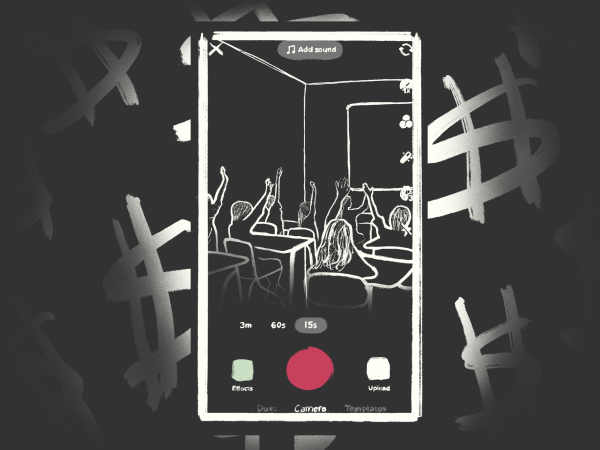The SheHawk: The perfect woman
Editor’s Note: Samantha Durham is a senior at UNCW studying sociology. She is the Opinion Editor for The Seahawk and enjoys concentrating her work on social issues. All opinions expressed in this article are solely those of the author. Samantha may be found on Twitter @Durham_Sam. All suggestions and inquires may be sent via email to [email protected].
The conversation of media representation of men and women in advertising has been an ongoing one. It seems like with every new magazine cover released women get thinner and men get fitter. All in all, the media and advertising industry have created an incredibly unhealthy expectation of what men and women should look like, leaving society to grapple with its unexpected consequences.
You may say to yourself that those images of overly sexualized women have no impact on you. You are proud of what you look like, how you present yourself and you feel little concern about how people perceive you. If that is you then good for you; many women feel less than for not meeting “society’s” expectations of the perfect woman. However, the impact these images have on society’s expectations, as well as our own expectations of ourselves, is bigger than we realize. Even if you don’t actively realize you are comparing yourself to someone, you are.
In class, we watched a documentary all about advertising based on gender. “Killing Us Softly” is a documentary series by Jean Kilbourne that focuses on how advertising is literally “killing us softly.” She explores the impacts of these advertisements on the minds of those taking them in.
One of the things she gets at is the idea of women as objects. Of course, we have all heard about the objectification of women and how women are more than just sex objects or wives. This is a little bit different in its function. Many ads now show just parts of a woman’s body, breaking her into multiple pieces and making her body or specific body part the subject of someone’s interest. It’s not about her; it’s about her perfect breasts, her shiny hair or smooth legs.
My professor said it well: “Advertising makes it so that women’s bodies are the subject of someone else’s pleasure, not their own.” That’s so sad to me, and it’s not like women don’t have other things to offer the world. It just seems the advertising industry forces society to get so hung up on the physical female body and the message it sends is that your value is found in what you look like, not in your personality or what you have to say.
How exactly does this make a difference in how women see themselves or how we are perceived by others? This doesn’t really need too much explanation, as it’s quite obvious. Advertisers throw literally perfect people up on their covers, with features that are unrealistic. Not one of those covers has not been edited and enhanced for “your viewing pleasures.” Advertisers will admit it too. None of those women or men look like that in reality, but that isn’t what you think about when you look at the cover. You think about yourself in comparison to what he or she looks like.
I am victim to this myself. I honestly do not believe there is a person out there who isn’t. We all compare ourselves to the people we see in advertisements. The implications of that, though, are horrible. The American Society of Plastic Surgery says it all. According to their website, 1.8 million cosmetic surgery procedures were performed in 2016. The top surgery was breast augmentation, which saw a 4% increase last year. Following breast augmentation we can see liposuction up by 6%, nose reshaping up by 2%, eyelid surgery up by 2% and facelifts up by 4%.
We can thank the advertisers in part for this rise in plastic surgeries and while plastic surgeons are probably thankful for the business why do we feel the need to change who we are? It’s all about chasing that perfect image. It’s the internal dialogue that says “I want to look like her”. However, that image is never achievable because the basis of the expectation is fake. We compare ourselves to unrealistically perfect pictures of people who they themselves don’t actually look that way. We measure ourselves to them by going over our bodies with a fine tooth comb and picking out every tiny difference we can out of fear that if we don’t hide or change those things about ourselves society won’t call us sexy, pretty or “the kind of girl he wants to take home to mom.”
Women truly have become the subject of someone else’s pleasure and it impacts not only how we act but also how others treat us. Boys grow up looking at the same images we do and they learn the same messages we do in a different way. If the media says we are objects for enjoyment, ownership and pleasure then why would we not get treated that way?
Of course people will argue it is about how we raise men and women. To that, I do not disagree but that is a subject for another day. That does play an important role because clearly not all men grow up with unrealistic expectations of women nor do all men feel women are something they own or can enjoy. However, the perception that women are sexy, flirtatious, beautiful and wild makes it almost look like women need men to tame that sexual “wild side”.
The NCADV states that 1 in 5 women in the United States have been raped in their lifetime compared to 1 in 71 men and 1 in 4 women are the victims of severe physical abuse by an intimate partner. Regardless if it is direct or not, advertisers do not help this issue. By showing women as objects it sends the sign that women are for others, not for themselves.
No one is “for” someone else and really should only be “for” themselves. I was not put on the planet to make a man happy or be the subject of his enjoyment, quite frankly I have much more I want out of my life than that. There is nothing wrong with wanting to be sexy or wanting to feel pretty. Wanting those things doesn’t mean that you are supporting the objectification of women. The fundamental difference is that you should want those things because you want them for yourself. You shouldn’t want them because that internal voice says “he won’t like me if I don’t dress this way” or “I won’t get his attention if I don’t look sexy”. If you feel that is how you need to present yourself for another person to value you then you need to look for someone else’s attention.
Worth is not found in the size of your bra, the length of your hair or in the perfection of your skin. Worth is found in being a person with depth and influence. Worth is being able to say you are proud of who you are regardless of what you look like. Your value is not measured by how many men desire to be in bed with you or how many eye glances you get in a day. Value and worth is so much more than that and it is time our advertisers show women what their true value is. My body is for me and who I chose to share it with and it is certainly not for the pleasure of others. It is for me and me alone.













